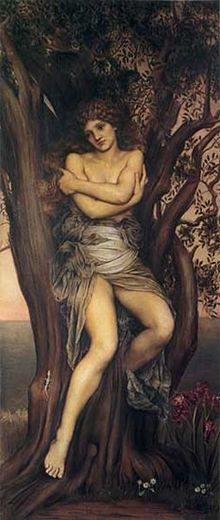- Nature deity
-
The term nature deity typically refers to the concept of gods or goddesses in mythology associated with various perceived "forces of nature". They feature commonly in polytheistic religions, and may include characteristics of the mother goddess, Mother Nature or lord of the animals. Adherents may literally consider such deities to be divine beings that control particular natural phenomena. An objective view understands these to be mythological personifications of particular phenomena, such that attach personal qualities such as character and name to such phenomena, and conversely illustrate conceptual persons (archetypes) as owning particular and powerful traits.
List of nature deities
-
- African mythology
-
- Dhat-Badan, Ethiopian and Yemeni goddess of the oasis
-
- Xochipilli, god of art, games, beauty, dance, flowers, maize and song
- Xochiquetzal, goddess of fertility, beauty, female sexual power, protection of young mothers, of pregnancy, childbirth, vegetation, flowers and the crafts of women
-
- Medeina, Lithuanian goddess of forests, trees and animals
-
- Abnoba, Gaulish goddess associated with forests and rivers
- Arduinna, goddess of the Ardennes forest region, represented as a huntress
- Cernunnos, horned god associated with horned male animals, produce and fertility
- Druantia, goddess associated with trees
- Nantosuelta, Gaulish goddess of nature, the earth, fire, and fertility
- Sucellus, god of agriculture, forests and alcoholic drinks
-
- Egyptian mythology
- Ash, god of the oasis and the vineyards of the western Nile Delta
-
- Selvans, god of the woodlands
-
- Antheia, goddess of flowers and flowery wreaths
- Anthousai, flower nymphs
- Artemis, goddess of the hunt, wild animals, wilderness, childbirth, virginity, fertility, young girls and health and plague in women
- Chloris, goddess of flowers and the spring
- Cybele, Phrygian goddess of the fertile earth, nature and wild animals
- Demeter, goddess of the harvest, the fertility of the earth, grains and the seasons
- Dionysus, god of wine, vegetation, pleasure and festivity
- Dryades, tree and forest nymphs
- Epimeliades, nymphs of highland pastures and protectors of sheep flocks
- Gaia, primeval goddess personifying the earth
- Hamadryades, oak tree dryades
- Hegemone, goddess of plants, specifically making them bloom and bear fruit as they were supposed to
- Meliae, nymphs of honey and the ash tree
- Naiades, fresh water nymphs
- Oceanides, fresh water nymphs
- Oreades, mountain nymphs
- Pan, god of shepherds, flocks, mountain wilds, hunting and rustic music
- Rhea, the great mother and queen of the mountain wilds
-
- Pachamama, fertility goddess who presides over planting and harvesting
-
- Konohanasakuya-hime, the blossom-princess and symbol of delicate earthly life
-
- Yum Caax, god of agriculture, wild plants and animals
-
- Abu, minor Sumerian god of plants
- Damu, Sumerian god of vegetation and rebirth
- Emesh, Sumerian god of vegetation
- Kishar, Akkadian goddess representing the earth
- Ningal, Sumerian goddess of reeds
- Ninhursag, Sumerian mother goddess associated with the earth and fertility
- Ningikuga, Sumerian goddess of reeds and marshes
- Ninsar, Sumerian goddess of plants
- Ua-Ildak, Babylonian and Akkadian goddess responsible for pastures and poplar trees
-
- Nei Tituaabine, Kiribati goddess of trees
-
- Jörð, personification of the earth
-
- Ceres, goddess of growing plants and motherly relationships, equivalent to the Greek goddess Demeter
- Diana, goddess of the hunt, wild animals, wilderness and the moon; equivalent to the Greek goddess Artemis
- Faunus, horned god of the forest, plains and fields
- Flora, goddess of flowers and the spring; equivalent to the Greek goddess Chloris
- Fufluns, god of plant life, happiness and health and growth in all things
- Nemestrinus, god of the forests and woods
- Ops, goddess of fertility and the earth
- Pilumnus, nature god who ensured children grew properly and stayed healthy
- Pomona, goddess of fruit trees, gardens and orchards
- Puta, goddess of the pruning of trees
- Silvanus, tutelary spirit or deity of woods and fields and protector of forests
- Terra, primeval goddess personifying the earth; equivalent to the Greek goddess Gaia
-
- Berstuk, evil Wendish god of the forest
- Jarilo, god of vegetation, fertility, spring, war and harvest
- Porewit, god of the woods, who protected lost voyagers and punished those who mistreated the forest
- Porvata, Polish god of the woods
- Siliniez, Polish god of the woods for whom moss was sacred
- Tawals, Polish blessing-bringing god of the meadows and fields
- Veles, god of earth, waters and the underworld
- Zeme, goddess of the earth
-
- Grand Bois, loa associated with trees, plants and herbs
- L'inglesou, loa who lives in the wild areas of Haiti and kills anyone who offends him
- Loco, loa associated with healers and plants, especially trees
Categories:- Lists of deities
- Nature deities
- Paganism stubs
- Mythology stubs
-
Wikimedia Foundation. 2010.

